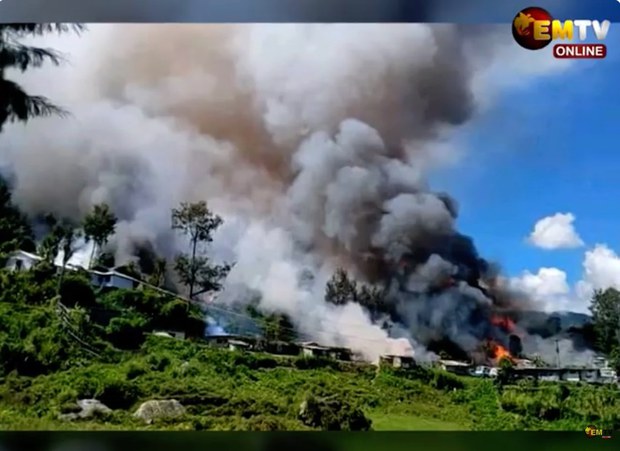Videos posted online show fires and families displaced by the presence of what the authorities call "illegal miners”, migrants from neighbouring areas who came to dig for gold. Local landowners get proceeds from the Porgera mine, one of the richest in the world, as compensation for environmental damage. Various groups have clashed over the mine, a scourge Pope Francis denounced a few days ago during his visit.

Port Moresby (AsiaNews) – At least 20 people died in violent clashes that broke out about five days ago near the Porgera gold mine, in Papua New Guinea’s Enga province.
The country’s police commissioner, David Manning, issued an emergency order to safeguard infrastructure and residents from "illegal miners" who "use violence to victimise and terrorise local landowners".
Papua New Guinea’s second-largest mine opened in 1990, and has been a source of conflict among tribal groups over land ownership.
Pope Francis touched this issue on several occasions during his recently completed visit to Asia and Oceania. Just a week ago, he urged an end to tribal violence and called for the equitable distribution of wealth from natural resources.
It is unclear how many illegal miners operate in the region, but according to local authorities, since the mine reopened in late 2023, the number of migrants digging for gold at the mine and surrounding areas has increased, clashing with local landowners who, instead, are compensated by foreign mining companies for the environmental damages they cause.
Back in April, following the reopening of the mine, Commissioner Manning labelled migrants from other parts of Papua New Guinea "illegal squatters”.
“These troublemakers are illegally taking up private lands to make illicit profit and they don’t care who they hurt or what they damage. This greed is harming the businesses and communities of the Porgera Valley,” he said.
To cope with the situation (despite today’s Independence Day celebration), security personnel have been authorised to use force to quell any violence.
Recent videos and pictures posted online show heavily armed men roaming the streets of the city, buildings burning, and displaced families.
Commissioner Manning ordered officers to move against anyone carrying a weapon. This means “that any person carrying an offensive weapon in public will be considered a threat and dealt with accordingly, with force,” he said on Saturday.
An additional 122 officers and some soldiers have been deployed to restore order. “We also call on the landowners to support security force operations for the protection of their people and infrastructure on their land,” Manning added.
According to Benar News, New Porgera, the company that runs the mine, has suspended its activities because it is unable to guarantee the safety of its personnel.
“Over the past twenty-four hours a significant escalation in tribal fighting has impacted many of our employees,” said James McTiernan, the company’s general manager, in a statement.
Local employees were allowed to take unpaid leave to move their families to safety.
The Porgera gold mine is located about 600 kilometres northwest of the capital Port Moresby, at an altitude of over 2,000 metres.
It is among the top 10 gold mines in the world, generating about 10 per cent of Papua New Guinea’s annual exports.
Since May, it is only possible to reach the site on foot or by air after a landslide cut off road links, killing more than 100 people,
The region is home to about 50,000 people in a country of 12 million.
New Porgera Limited is 51 per cent owned by Papuan shareholders (Kumul Minerals, a state-owned holding company, local landowners, and Enga province) while 49 per cent is held by Barrick Niugini, a joint venture between Canada's Barrick Gold and China's Zijin Mining.
In 2019, the Papua New Guinean government refused to renew the license of foreign companies, leading to the closure of the mine in April 2020. But operations resumed on 22 December 2023 after long negotiations.
On several occasions, residents have reported violence by security personnel and tried to draw attention to the problem of mining waste and tailings, which have polluted local rivers for years, and made parts of the land useless.
No comments:
Post a Comment